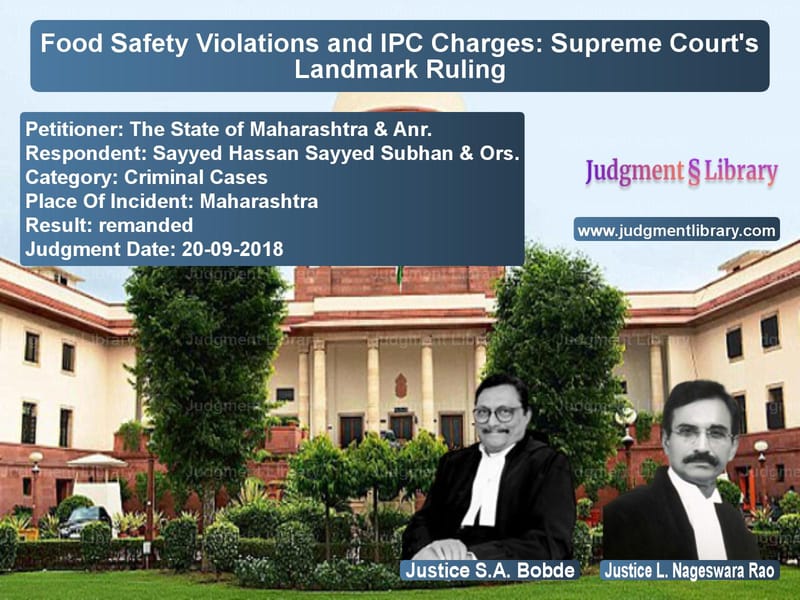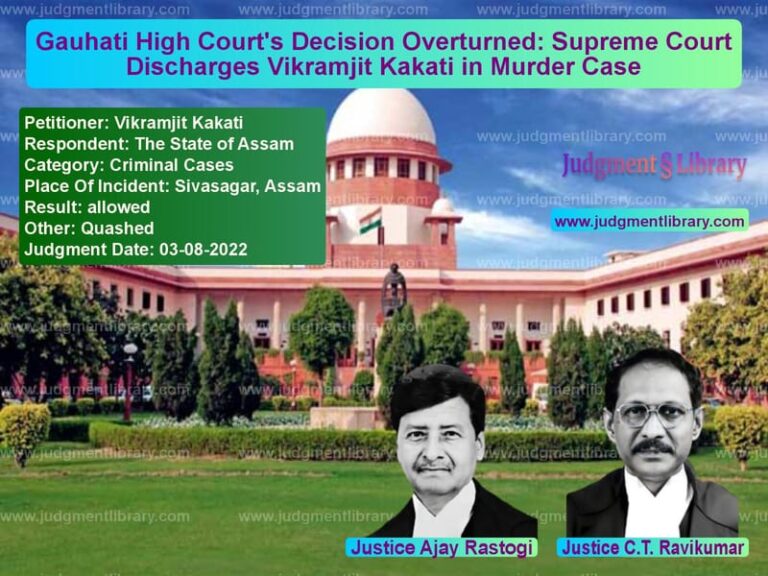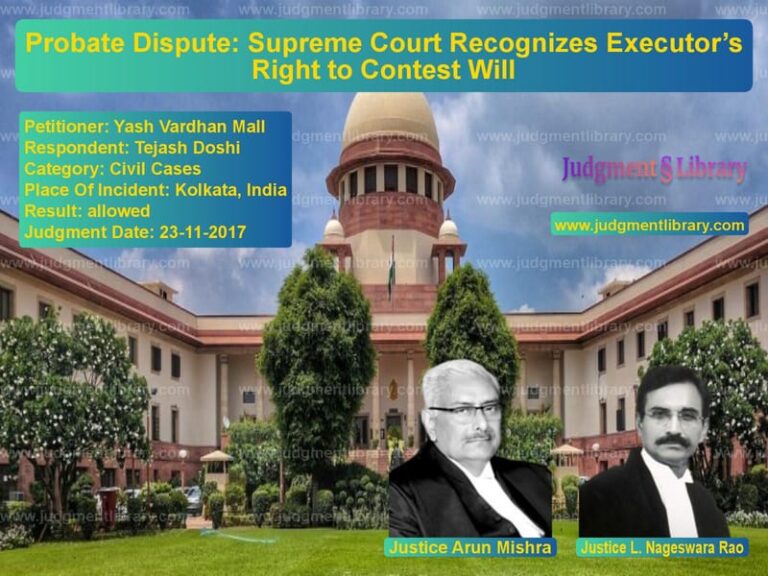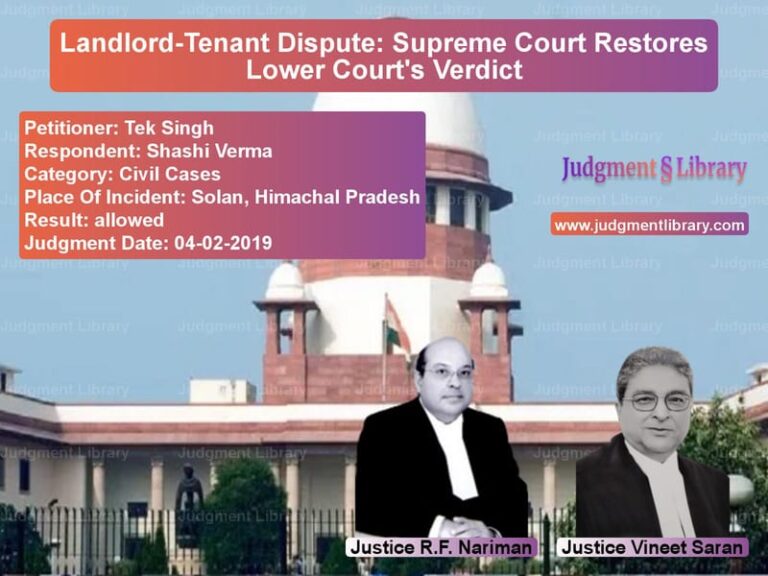Food Safety Violations and IPC Charges: Supreme Court’s Landmark Ruling
On 20th September 2018, the Supreme Court of India delivered a significant judgment in The State of Maharashtra & Anr. v. Sayyed Hassan Sayyed Subhan & Ors., addressing whether violations under the **Food Safety and Standards Act, 2006 (FSS Act)** could also attract charges under the **Indian Penal Code (IPC)**. The case involved the sale and transportation of **gutka and pan masala**, which had been banned under state orders due to public health concerns.
The Supreme Court ruled that **IPC provisions could be applied alongside the FSS Act**, setting aside the Bombay High Court’s decision that restricted prosecution only under the FSS Act. The Court held that there was no statutory bar preventing the application of the IPC in food safety-related cases.
Background of the Case
The Maharashtra Government had issued a notification on 18th July 2013, under **Section 30 of the FSS Act**, prohibiting the manufacture, storage, distribution, and sale of tobacco and areca nut products, including gutka and pan masala. Several FIRs were registered against violators, charging them under:
- Sections **26 and 30** of the **FSS Act**
- Sections **188, 272, 273, and 328** of the **Indian Penal Code (IPC)**
The accused individuals filed **Criminal Writ Petitions and Criminal Applications** in the **Bombay High Court**, seeking the quashing of these FIRs. The **High Court ruled in their favor**, quashing the criminal proceedings under the IPC and holding that only the FSS Act could be used to penalize them. Aggrieved by this, the **State of Maharashtra** approached the **Supreme Court**.
Legal Issues Considered
The Supreme Court examined two critical questions:
- Can **Food Safety Officers** initiate prosecution for offenses punishable under the IPC?
- Do the actions of the accused amount to offenses under **IPC provisions**, in addition to the **FSS Act**?
Arguments by the Appellant (State of Maharashtra)
The State of Maharashtra, through its counsel, argued:
- The **manufacture, transport, and sale of banned food items** posed a serious threat to public health, justifying prosecution under the IPC.
- The **FSS Act did not bar the applicability of the IPC**, and food-related offenses could be prosecuted under both laws.
- The High Court erred in concluding that violations of the FSS Act could be penalized only under that statute.
- Section 188 of the IPC (disobedience of an order lawfully promulgated by a public servant) was directly applicable.
Arguments by the Respondents (Accused Individuals)
The respondents, through their legal counsel, countered:
- The **FSS Act was a special law**, and under its framework, penal consequences were limited to fines and penalties within the Act.
- The **High Court correctly ruled that offenses under the FSS Act could not be combined with IPC provisions**.
- Section **55 of the FSS Act**, which prescribes fines for non-compliance with Food Safety Orders, was sufficient to address their actions.
- Since the law already had a prescribed **penalty structure**, invoking the IPC was unnecessary and excessive.
Supreme Court’s Observations
The Supreme Court, comprising **Justice S.A. Bobde and Justice L. Nageswara Rao**, analyzed the legal provisions and made the following key observations:
On the Applicability of IPC alongside the FSS Act:
“The High Court was clearly wrong in holding that action can be initiated against defaulters only under Section 55 of the FSS Act. There is no bar to a trial or conviction of an offender under two different enactments unless expressly prohibited by law.”
On Section 188 of the IPC:
“Section 188 of the IPC applies even when the act complained of tends to cause danger to human life, health, or safety. The prohibitory order of the Commissioner, Food and Safety, is an order contemplated under Chapter X of the IPC.”
On General Principles of Double Jeopardy:
“There is no bar to prosecuting offenders under both the IPC and the FSS Act. However, an individual cannot be punished twice for the same offense. This principle is reflected in Section 26 of the General Clauses Act, 1897.”
Final Judgment
After careful consideration, the Supreme Court ruled:
- The High Court’s ruling that only the FSS Act was applicable was incorrect.
- The **IPC provisions, including Sections 188, 272, 273, and 328, were applicable** in addition to the FSS Act.
- The matter was **remanded to the High Court for reconsideration**.
- Until the High Court resolved the matter, **no coercive action** could be taken against the respondents.
Impact of the Judgment
The Supreme Court’s ruling has far-reaching consequences for **food safety enforcement and criminal law** in India:
- Parallel enforcement of laws: Violations under the FSS Act can attract **both administrative penalties and criminal prosecution** under the IPC.
- Strengthening public health laws: The judgment empowers authorities to take stringent action against **adulterated and harmful food products**.
- Preventing misuse of legal loopholes: Defendants can no longer argue that **FSS Act penalties replace IPC charges**.
- Balancing rights and legal safeguards: While permitting IPC prosecution, the Court ensured that **no person would be punished twice for the same offense**.
This ruling serves as a crucial precedent in **food safety enforcement** and ensures that **public health violations are treated with the seriousness they deserve**.
Petitioner Name: The State of Maharashtra & Anr..Respondent Name: Sayyed Hassan Sayyed Subhan & Ors..Judgment By: Justice S.A. Bobde, Justice L. Nageswara Rao.Place Of Incident: Maharashtra.Judgment Date: 20-09-2018.
Don’t miss out on the full details! Download the complete judgment in PDF format below and gain valuable insights instantly!
Download Judgment: The State of Maharas vs Sayyed Hassan Sayyed Supreme Court of India Judgment Dated 20-09-2018.pdf
Direct Downlaod Judgment: Direct downlaod this Judgment
See all petitions in Bail and Anticipatory Bail
See all petitions in Fraud and Forgery
See all petitions in Attempt to Murder Cases
See all petitions in Judgment by S. A. Bobde
See all petitions in Judgment by L. Nageswara Rao
See all petitions in Remanded
See all petitions in supreme court of India judgments September 2018
See all petitions in 2018 judgments
See all posts in Criminal Cases Category
See all allowed petitions in Criminal Cases Category
See all Dismissed petitions in Criminal Cases Category
See all partially allowed petitions in Criminal Cases Category







